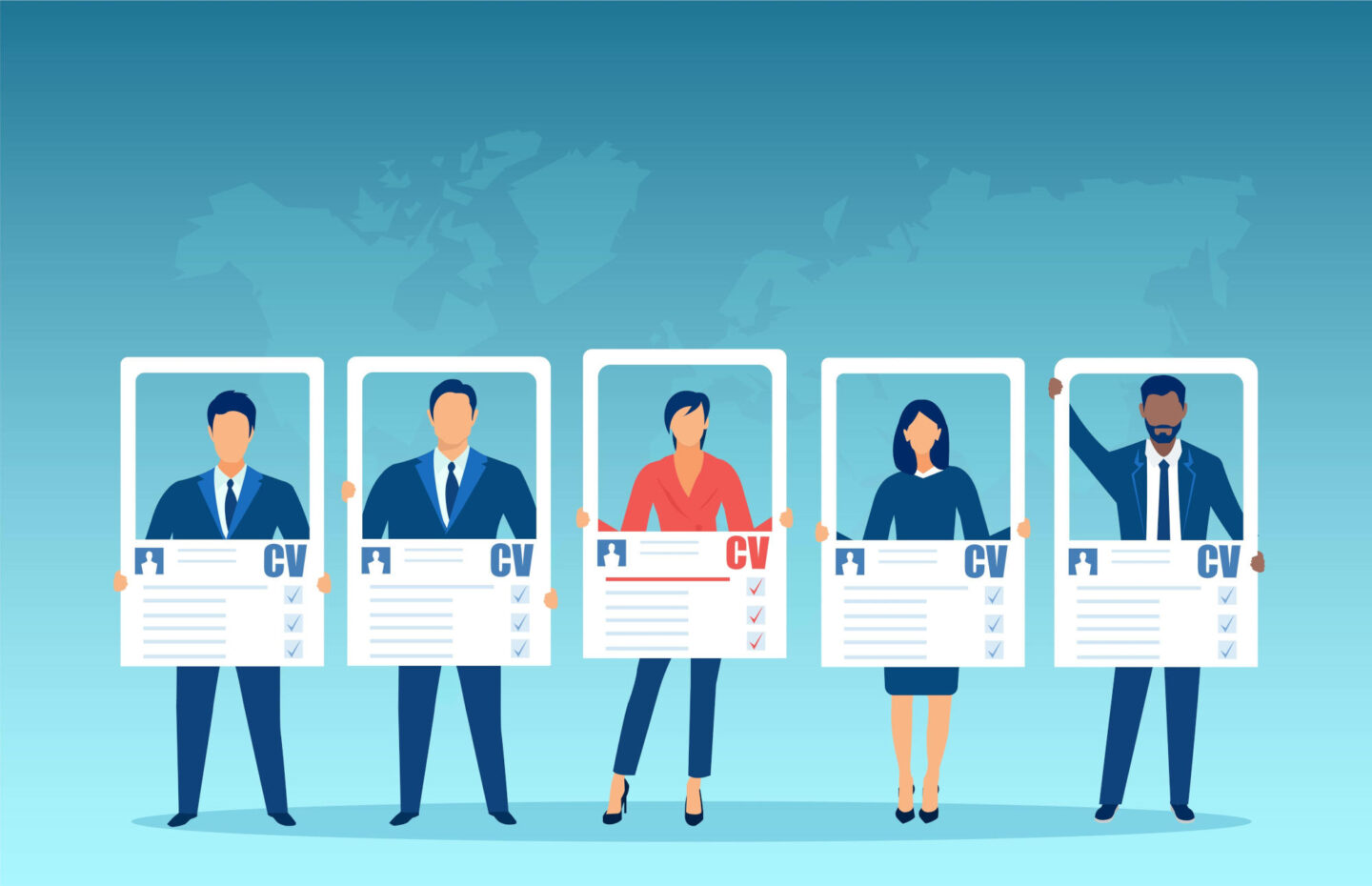
How to win over DE&I doubters and disruptors
Effective DE&I strategies are proven to enhance performance, yet they still face resistance – perhaps now more than ever. Here’s how to convince the naysayers....
Audio available

by Lars Häggström, Christian Dummett, Evgeniya Yaroslavtseva Published January 6, 2025 in 2025 Trends • 7 min read
Artificial intelligence (AI) is shaking up the global labor market, changing how candidates apply for new roles and how recruiters sift through a growing flood of job applications, all while introducing new challenges like potential bias and over-reliance on technology.
AI, especially the generative kind that can churn out text in seconds, promises to boost efficiency for job seekers and hiring managers alike but it also introduces several thorny challenges that they both need to grapple with.
For job candidates, it is no longer enough to rely on traditional methods like personal connections and manual effort to land a new role. Standing apart from the pack now requires that they use AI tools, such as GPT-4, VMock, JobScan, and CareerSet that can all help with crafting CVs and cover letters – but in a strategic way, combined with an authentic personal touch.
For recruiters, balancing the power of automation with human judgment is crucial to finding the best candidates while maintaining all-important fairness and inclusivity.
As we head into 2025, it’s clear that adapting thoughtfully to AI is imperative for both sides of the employment equation.
The efficiency of AI has also lowered the barrier to entry for job applications, enabling people to apply for jobs with minimal effort, leading to a major surge in application volumes, especially at the lower rungs of the corporate ladder.
For job seekers, AI tools have significantly altered how they approach applications, from crafting CVs to interview preparation. With platforms like GPT-4 maker OpenAI offering polished text at the click of a button, the application process has become faster and more accessible.
Yet, these same advancements have also heightened competition, creating a new challenge: how to stand out amid a growing ‘sea of sameness’ in AI-generated applications.
AI tools are undeniably effective at helping candidates get the basics right. A tailored CV can pass through an Applicant Tracking System (ATS) that companies use to streamline the recruitment process by automatically screening job applications and resumes. Additionally, auto-generated cover letters can be crafted to align perfectly with job descriptions.
These tools are particularly beneficial for candidates at the beginning of their careers or those unfamiliar with the conventions of job applications. However, over-reliance on AI often creates generic and impersonal submissions. Hiring managers regularly tell us that such applications are polished but ultimately lack the individuality and personality that make a candidate memorable. Job applicants must ensure that their CV not only passes ATS scanning but also stands out to human reviewers, especially as many applications tend to look alike.
The efficiency of AI has also lowered the barrier to entry for job applications, enabling people to apply for jobs with minimal effort, leading to a major surge in application volumes, especially at the lower rungs of the corporate ladder.
In the UK, employers received an average of 140 applications per role for graduate training schemes in 2024 – a staggering 59% jump from 2023, according to the Institute of Student Employers.
However, this ease of application has paradoxically created a more challenging environment for candidates. With employers now inundated with hundreds – sometimes thousands – of applications per position, simply meeting basic criteria is no longer enough.
Another concern is the risk of misrepresentation. Some candidates lean too heavily on AI, exaggerating qualifications or presenting an overly polished image. This can lead to uncomfortable mismatches later in the hiring process, especially during interviews, where authenticity and depth of experience become critical.

“While AI tools can help refine applications, personal connections within organizations can elevate a candidate’s profile.”
In a competitive labor market with fewer job postings being reported in major economies such as the UK, US, Germany, and Canada, candidates need a multi-pronged approach. The most successful applicants use AI as a foundation, not a replacement.
For example, generating a first draft of a cover letter through AI can save time, but personalizing it with unique anecdotes, specific achievements, and a touch of individuality will make it stand out. Authenticity is non-negotiable in a market saturated with formulaic applications.
Networking is another essential strategy. While AI tools can help refine applications, personal connections within organizations can elevate a candidate’s profile. Referrals and endorsements from internal contacts remain a powerful way to ensure a CV gets noticed amid the digital deluge.
Establishing these relationships through platforms like LinkedIn or professional events can offer a significant edge.
Moreover, candidates must balance technological proficiency with traditional preparation. While AI simulations offered by platforms like Final Round AI can provide useful interview practice, real-world preparation, such as researching company culture and anticipating behavioral questions that assess how a candidate has handled specific situations in the past, is still irreplaceable.
Candidates also need to articulate their unique value proposition, backing it up with concise examples in competency-based interviews, practicing business case scenarios in advance, and preparing thoughtful, standout questions for the end of the interview.

On the recruitment side, AI has become indispensable for managing the sheer scale of applications that modern job markets generate. From initial screenings to conversational tools that simulate interviews, automation is changing how hiring teams operate.
Yet these advancements bring their own complexities, from ethical concerns to maintaining the human touch in hiring.
For recruiters, the greatest advantage of AI lies in its ability to process high volumes of applications quickly and efficiently. High-demand positions often attract thousands of applicants, making it nearly impossible for HR teams to manually review every submission.
AI-powered systems can filter applications based on specific criteria, such as required technical skills or years of experience, dramatically reducing the workload. In roles where objective qualifications are paramount, these systems have proven highly effective.
However, the reliance on AI has also raised major ethical concerns. Early iterations of AI-driven recruitment tools were rightly criticized for perpetuating biases, particularly around gender, ethnicity, and socioeconomic background.
For example, algorithms trained on historical hiring data tended to favor candidates who matched the profiles of existing employees, inadvertently excluding underrepresented groups. While many companies have taken steps to address these issues, they serve as a stark reminder that technology is only as unbiased as the data it is fed.
Also, candidates often feel devalued by impersonal, automated rejection notices, raising concerns about employer reputation and its impact on attracting future talent.

As AI becomes more deeply integrated into recruitment, striking the right balance between efficiency and empathy will be crucial to hiring and holding top talent.
While algorithms excel at filtering for technical fit, they risk falling short in assessing softer qualities like creativity, cultural match, and the potential for growth – qualities that require a human touch. For recruiters, blending AI-driven insights with personal judgment is essential to making well-rounded hiring decisions.
Transparency is another area where recruiters can make strides. Clearly communicating how AI is used in the recruitment process can help build trust with candidates, particularly those wary of being evaluated solely by machines. Offering opportunities for applicants to provide additional context through follow-up questions or interviews can further humanize the process.
Upskilling HR teams is also critical. As AI tools grow more sophisticated, recruiters need to understand how to interpret and apply these insights effectively. This includes recognizing the limitations of AI and knowing when to override its recommendations in favor of human evaluation.
It's clear that the job market of 2025 will demand changes from both candidates and recruiters.
It’s clear that the job market of 2025 will demand changes from both candidates and recruiters. For job seekers, the challenge is to embrace AI as a tool while safeguarding their individuality. Networking, tailored applications, and thorough preparation will remain vital to standing out in a crowded field. Candidates must, ultimately, strike a balance between leveraging technology and showcasing their unique value.
For recruiters, the focus should be on embracing AI as a tool for efficiency while ensuring fairness, blending its analytical power with the empathy and judgment that only humans can provide.

Senior Adviser, IMD Business School
Lars Häggström is Senior Adviser at IMD and a former CHRO at Stora Enso, Nordea and Gambro.

Assistant Dean and Director of Career Development, IMD
Christian Dummett is Assistant Dean and Director of Career Development at IMD, where he leads a team of career professionals and provides post-graduate business career support to multinational MBA and EMBA students. Before that he worked at London Business School where he spent a decade in senior career services and senior management roles. Dummett has a distinguished career in international finance, marked by a time in Switzerland at the Bank for International Settlements in Basel.

MBA Career Lead and Executive Career Coach
Evgeniya Yaroslavtseva is a MBA Career Lead and Executive Career Coach at the IMD Career Development Center. With extensive corporate HR experience and an ICF coaching accreditation, she is dedicated to advancing the career success and employability of MBA students. Her expertise spans designing talent programs, leading learning initiatives, and delivering individual and team coaching to foster career growth and professional development.

May 22, 2025 • by Josefine van Zanten, Luca Condosta in 2025 Trends
Effective DE&I strategies are proven to enhance performance, yet they still face resistance – perhaps now more than ever. Here’s how to convince the naysayers....
 Audio available
Audio available
April 22, 2025 • by D W Pine in 2025 Trends
Responsible for TIME magazine’s iconic covers, D W Pine explores his creative process and shares insights on how to cut through the noise and make an impact....

February 7, 2025 • by Carlos Cordon in 2025 Trends
President Trump will be erratic, warns IMD’s Carlos Cordon, so supply chain leaders must be prepared to work with what he gives them...

February 3, 2025 • by Natalia Olynec in 2025 Trends
Warnings about alcohol’s harms by medical experts are nothing new. But the drinks industry is now taking sobriety seriously by investing in a growing range of alternative products....
Explore first person business intelligence from top minds curated for a global executive audience